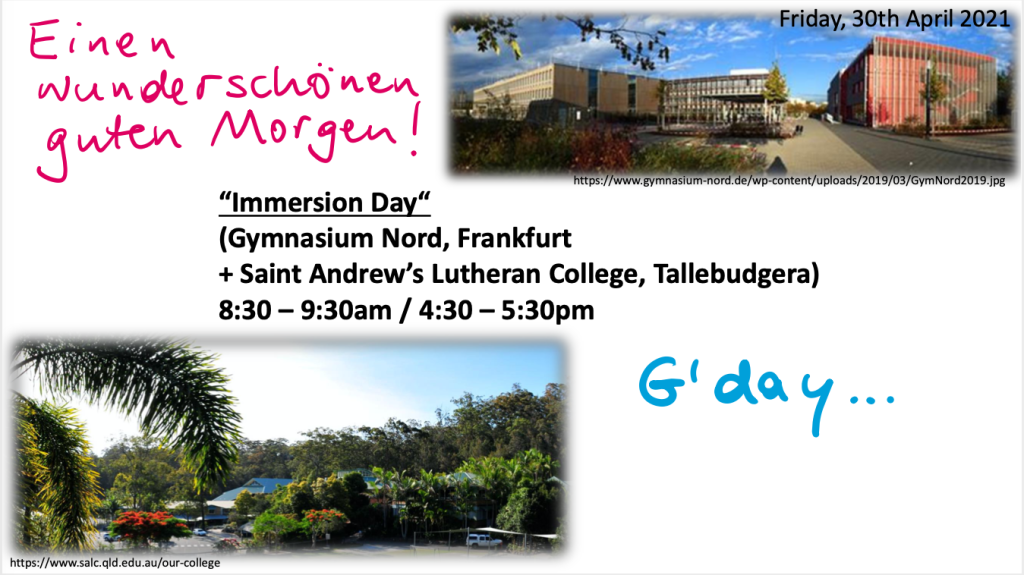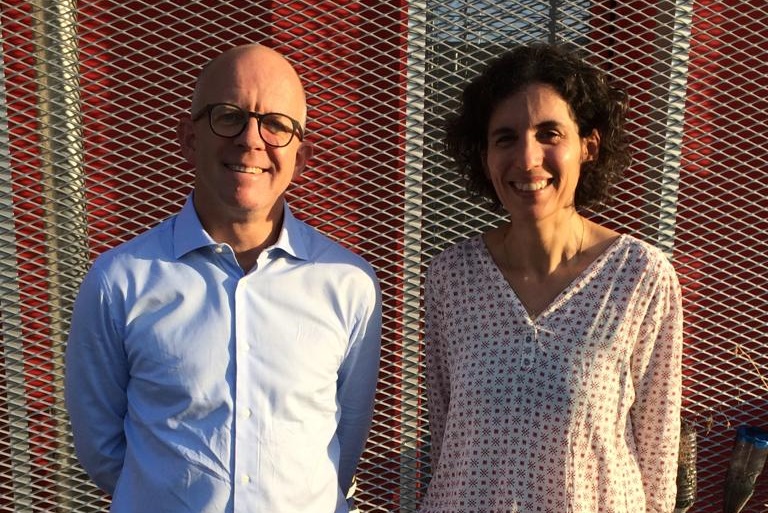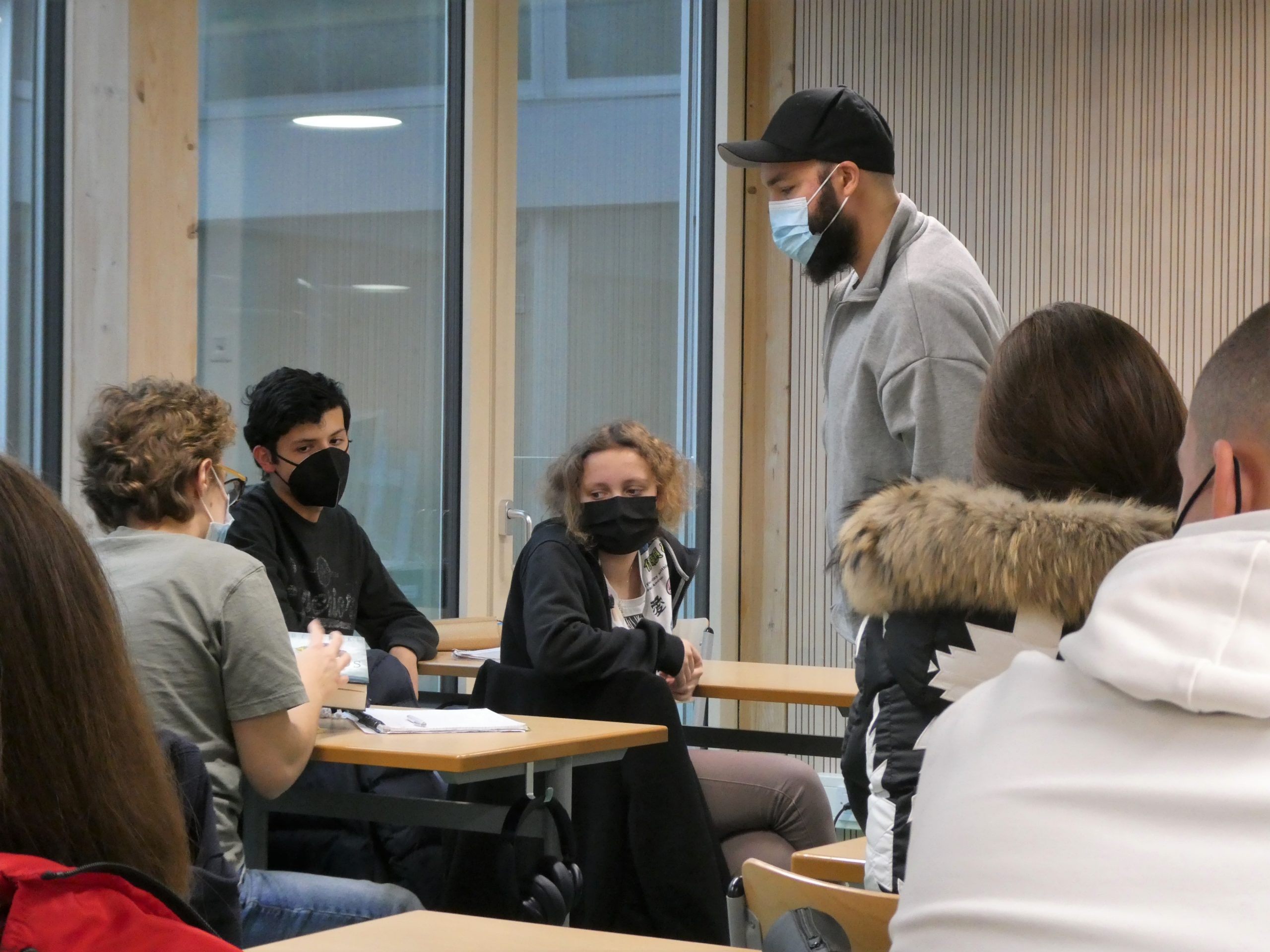‚English immersion day‘ mit einer australischen Schule
„Australian-German Immersion day“ – a bilingual report
In der letzten Aprilwoche hätten wir, die „Bili-Klasse“ 9a, eigentlich in England sein und uns die Mägen mit scones und fish and chips vollschlagen sollen, doch Corona hatte es nicht gut mit uns gemeint. Wenn wir durch die aktuellen Corona-Beschränkungen nicht mal unsere Mitschüler und Mitschülerinnen sehen dürfen, wie sollte es dann mit einer Reise in ein anderes Land funktionieren?

Zum Glück sind wir nicht die einzigen, die so eine schwere Zeit durchmachen. So wie wir eigentlich in England hätten sein sollen, so hätten die Deutschschülerinnen und -schüler des australischen St. Andrew‘s Lutheran College auch statt ihres sogenannten „immersion day“ eigentlich in Deutschland sein und sich mit der Frage beschäftigen sollen, ob das Gebäck als Kreppel oder doch als Berliner bezeichnet werden soll. Als eine coronafreundliche Alternative fand am Saint Andrew´s College am 30. April der „immersion day“ statt, an dem die Schülerinnen und Schüler einen Tag lang in die deutsche Sprache und Kultur „eintauchten“: Neben Sprach- und Konversationsunterricht, dem gemeinsamen Schauen eines deutschen Films und dem Besuch eines deutschen Restaurants in der Nähe der Schule, sollten die australischen Schülerinnen und Schüler ihre Deutschkenntnisse auch mit „echten Deutschen“ unter Beweis stellen. Bei einem kleinen Onlineaustauschprogramm mit unserer Klasse hatten auch wir die Gelegenheit, mal wieder mit native speakers Englisch zu sprechen: Per Videokonferenz in Kleingruppen unterhielten wir uns sowohl auf Deutsch als auch auf Englisch über die verschiedensten Themen und stellten uns Fragen, die wir zuvor im Unterricht vorbereitet hatten. Zwar sprachen unsere australischen Gesprächspartnerinnen und -partner unsere Sprache nicht so fließend, aber es war sehr erstaunlich, wie gut sie die Grammatik und die Aussprache beherrschten.
Selbst wenn die Unterhaltungen nur ca. 40 Minuten dauerten, erfuhren wir in der Zeit viel über sie und einige vereinbarten sogar, den Kontakt aufrecht zu erhalten. Es war wirklich schön, diese Erfahrungen zu machen, die die Coronazeit etwas verschönerten, weshalb wir dies auch sehr gerne wiederholen möchten. Für diese wunderschöne und sehr unterhaltsame Zeit bedanke ich mich im Namen der Klasse 9a bei unsere Englisch- und Klassenlehrerin Frau Dietrich.
Shara, 9a
On April 30th 2021, our class (9a) held a video conference with a group of German students of Saint Andrew’s Lutheran College (SALC) in Tallebudgera, located on the Gold Coast, approximately 77 km from Brisbane. It was their so-called “Immersion Day” for both the German and Japanese classes, during which they “immerged” into the respective language and culture by having different kinds of lessons and activities such as watching a German movie, going to a nearby German restaurant and talking to a group of German students. We had the fun honor of being these German students and having this awesome meeting with them.
Meeting up at approximately 8:30am, for them 4:30pm, the Australians had “some failure with the connection” – as their German teacher Mr. Schaich remarked with a wonderful Australian accent, which we had already heard in a few listening comprehension tasks from our English book at school. After a few minutes the teachers greeted us and we saw the whole group in the computer lab of their school – due to very low Corona incidence rates Australian students don´t have homeschooling. Then we all went into our preassigned groups. We were all a tad surprised at how competently they spoke German, which must be really hard to learn as a foreign language. The range of years of German lessons taken varied from student to student as there were students from grade 10 to grade 12 among them. We had about half an hour to talk with each other, which had been planned to be used as follows: In the first half they ask us questions in German (and we respond in German) about our age, family hobbies etc., while in the second half us Germans ask them questions in English (and they reply in English); the questions we had prepared included what they know and think of Germany, their travel experience in and outside Australia, how Corona effects their lives, school life in Australia and some other aspects we had learned about their continent at school. We ended up switching between the two languages a little more spontaneously, but it went very smoothly and in the end everyone wished we had had more time to talk and get to know each other. Finally we all told each other how glad we were to have had this experience and that a repeat would be very much welcomed.
After this online meeting the Australians went on with their immersion day going to a German restaurant to eat what is commonly thought to be typical German food: “Sauerkraut”, mashed potatoes and “Bratwurst”, informally called “snagz” (sausages). My sister and classmate Fiamma managed to witness – over a video – how one of the Australian students ate “Sauerkraut” for the first time in his life, which apparently wasn’t his favorite “German experience” that day…
Amelie, 9a




